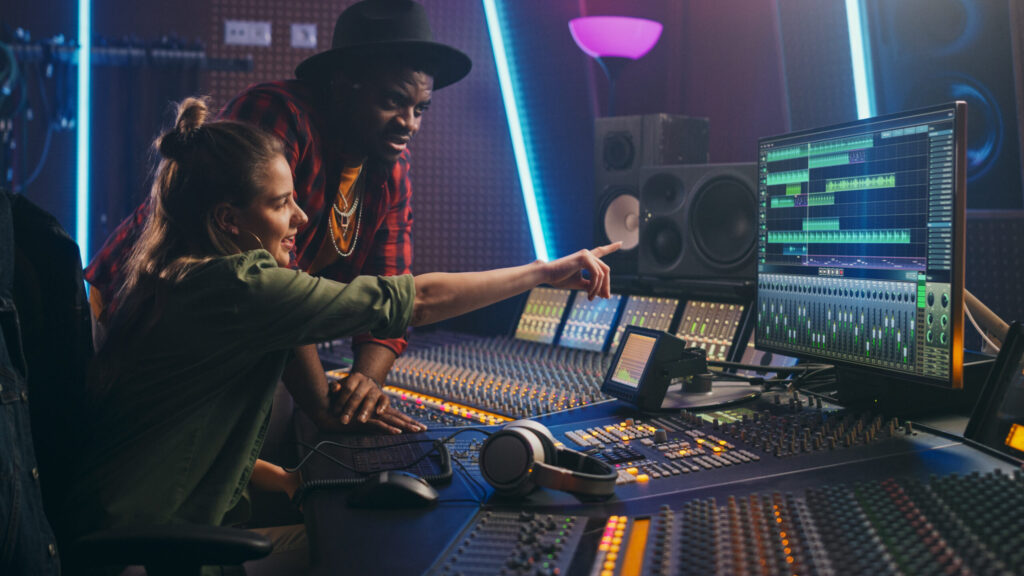Certificate of Higher Education Music Production
*Subject to approval
Get ready to embark on a year-long artistic adventure in one of the world’s leading musical cities: London or Berlin. Our Creative Capitals offer festivals and venues that cater to every taste, and this practical programme presents a unique opportunity to hone your production skills while living the artistic dream.
London and Berlin are fully committed to supporting emerging artists, each housing a multitude of major record labels, promotors and agents. This means that your path to success may be just around the corner…
All our BIMM University campuses feature cutting-edge software and facilities. During your time here, you can make the most of our high-tech recording studios, post-production suites, and state-of-the-art Mac labs. You’ll be taught by leading experts, and our legendary masterclasses enable you to gain valuable insight about the music industry from those at the very top of their game.


The Music Production pathway is designed to prepare you for the dynamic – and constantly evolving – technological landscape of the music industry. With a strong emphasis on creative programming, the course equips you with the tools you need to craft exciting soundscapes, and modules on recording and mixing will allow you to bring your creations to life.
Taught by our expert lecturers, you’ll learn the ins and outs of audio capture, sampling, synthesis and composition. With a solid foundation in the theory and practice of audio production, you’ll learn to face technical, artistic and professional challenges with flexibility and innovation.
The ‘Studio Project’ module is designed to immerse students in real-world working practices and encourage collaboration. This will also inform your individual reflective portfolio, which you’ll be curating throughout your course.
If you choose to study in London, you’ll specialise even further by selecting one of these two music production courses:
- If you’re into the electronic side of things and want a career using technology to make your own beats, then Electronic Music Production will help you get there.
- If you’re looking to bring your technical knowledge and creativity to live and studio settings, then Music and Sound Production is for you.
So, if you’re ready to create music, and to make friends and memories that will last a lifetime, then join us in London or Berlin and let your creativity soar.
Course Specification
Mode of attendance: Full-time
Length of course: 1 year
Awarding institution: BIMM University
Campus delivery: London and Berlin
UCAS code: W320
Language of study: English
Credits: 60 ECTS/ 120 FHEQ (UK)
Final award: Dependent on pathway, one of the following;
- CertHE Music (Popular Music Performance)
- CertHE Music (Songwriting)
- CertHE Music (all Music Production pathways)
Minimum Requirements
Successful completion of a BIMM admissions assessment.
Minimum of 2 A-levels at Grade C or above (64 UCAS points), OR BTEC Level 3 equivalent, and normally three GCSEs at a minimum grade C/4, including English Language.
IELTS 6.0 with a minimum of 5.5 to be achieved in each band.
Course Fees
Please visit our Fees page for information on access to student loans. Please note, UK students eligible for loans are able to borrow the full course fee for BIMM Music Institute degrees.
Year 1
All students take the following core modules.
Summary
In this module, you will learn sequencing and arranging techniques to facilitate your development as a producer and composer. There will be a focus on the use of foundational music theory concepts which underpin the rhythmic, harmonic, and melodic aspects of composition.
The module positions arrangement as the main lens through which the selection and application of tools and techniques are viewed- where the study of song form and structure will guide your choices of DAW programming and sequencing approaches used for achieving a coherent arrangement.
Module Aims
- Utilise midi protocols in a DAW
- Apply fundamental sequencing techniques
- Develop listening and arrangement skills using fundamental music theory to underpin creative choices
Summary
The module will introduce the theory and practice of sample-based music production through practical exploration and applied theory. You will learn a variety of audio editing, audio manipulation, and sampling techniques, as well as digital audio theory.
Module Aims
The module will encompass the fundamentals of sample-based production, such as sample types, sampling techniques, and audio editing methods. You will learn how to manipulate samples and incorporate them into your own arrangements, as well as how to generate unique sounds using various processing techniques which meet the standards of the modern music production industry.
This module will look at recording audio practically for the modern engineer. It will complement the theories studied in Audio Fundamentals. We will focus on modern engineering essentials and apply them to any setup from large format consoles to bedroom studios. We will focus on gain staging, use of analogue and digital equipment, Mic placement and techniques and running a recording session.
Summary
This module introduces composition techniques and music theory as they apply to contemporary music production as a key part of the modern producer’s toolkit. Through developing critical listening skills and researching practitioners, you will apply these ideas to your own creative work.
The module develops critical listening skills and encourages students to actively analyse and deconstruct different musical genres. Students will learn contemporary music theory by identifying compositional elements like harmonic progressions, melodic structures, and rhythmic patterns.
The module encourages students to research influential practitioners and their work. Students will learn about composition’s many possibilities by studying these artists’ methods. This practice-based research-driven approach allows students to expand their creative horizons and apply their newfound knowledge to their own production. They will also gain a deeper understanding and appreciation for the art of composition itself.
The module empowers students to become confident and skilled self-produced artists by exploring influential practitioners’ work, expanding creative horizons, and applying new knowledge.
Module Aims
- To facilitate the development of your competence and confidence in using music theory to support your composition
- To build awareness of the impact of your compositional choices on the music you make
Summary
This module will provide you with an exploration of the theory and application of music synthesis. You will learn about the principles and techniques of sound synthesis, including the several types of synthesis methods and the use of synthesizers in contemporary music production.
Module Aims
The module will explore the fundamental concepts of synthesis, including subtractive synthesis, additive synthesis, wavetable synthesis, and frequency modulation synthesis. You will also learn about the several types of synthesisers, including analogue, digital, and software synthesizers, and their use in contemporary music production.
Summary
This module will introduce the art and techniques of mixing multiple sources of audio into a cohesive-sounding ‘mix.’ The skills developed in this module will allow you to mix multi-track electronic compositions, multi-mic’d live performances or soundtracks for visual media. You will identify areas of the original audio that require improvement, such as sonic quality, arrangement, or performance. You will utilise a variety of tools and techniques related to level balance, spatial image, and frequency balance, and will apply creative processing techniques as relevant to your chosen field of work.
Module Aims
During this module, you will develop your ability to mix multitracked recording projects. This module will also help you develop the following graduate attributes:
- Employability
- Self-Awareness
- Resilience and Adaptability
- Creativity, Collaboration and Connectedness
Full module description to be confirmed
Any questions?
For any questions regarding our courses or if you’d like more information on how to apply to BIMM Music Institute, please contact our Enquiries Team on 01273 840 346 or email [email protected].

